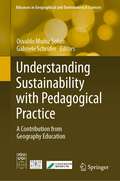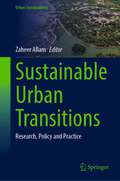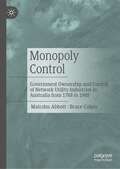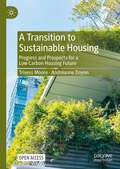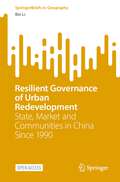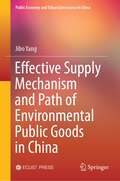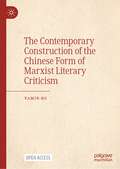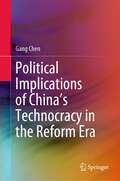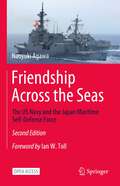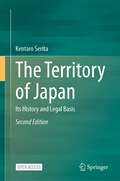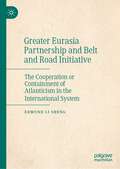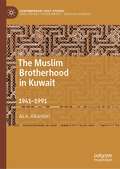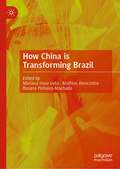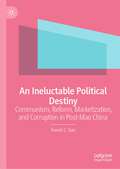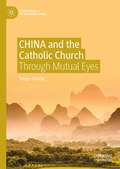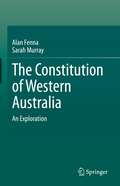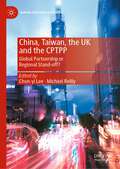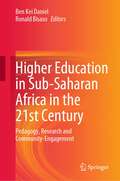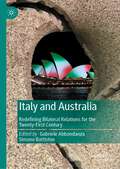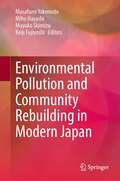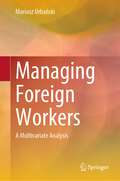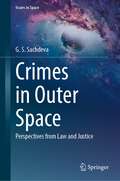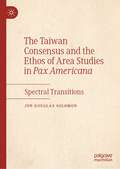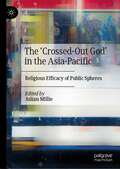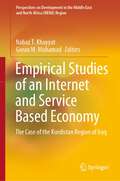- Table View
- List View
Understanding Sustainability with Pedagogical Practice: A Contribution from Geography Education (Advances in Geographical and Environmental Sciences)
by Osvaldo Muñiz Solari Gabriele SchrüferThis book shares with an international audience of teachers, scholars, and policymakers the experience of pedagogical practices to facilitate sustainability in the world. Sustainability is seen here as a journey toward the end state of sustainable development. Therefore, the authors contribute different roads to engage teachers and students with pedagogical discourse. Overall, the book demonstrates the value of powerful knowledge through action-oriented learning based on a bottom-up process. Consequently, pedagogical practices are understood as the instructional approaches based on a social constructivist model in which active learning is performed with student-to-student engagement. Secondary teachers in social sciences and university professors in geography find the study to be a valuable source of stimulation for incorporating new ideas and resolving common problems in their learning and teaching environments. Education policymakers around the world also benefit from the only publication that presents international perspectives on geographical knowledge related to sustainability.The contributing authors are experienced scientists in the field of geography education who are giving special attention to pedagogical practices that promote new directions toward sustainable thinking.This book is the first outcome of an international collaboration officially established in 2023 between the Department of Geography and Environmental Studies at Texas State University and the Department of Geography at the University of Bayreuth.
Sustainable Urban Transitions: Research, Policy and Practice (Urban Sustainability)
by Zaheer AllamThis book aims to explore how sustainability transitions can be explored in current and future cities and how research and policy approaches can be applied to change urban life as we know it, hence aligning the two thematic of urban science and future science, for achieving deep decarbonization. On this, the discourse on philosophy, ethics, and morality appertaining to sustainable cities and urban transitions, across disciplines, are also welcomed as it provides a deeper understanding of humanity in future scenarios. Chapter 08 is available open access under a Creative Commons Attribution 4.0 International License via link.springer.com.
Monopoly Control: Government Ownership and Control of Network Utility Industries in Australia from 1788 to 1988
by Malcolm Abbott Bruce CohenThis book traces the historical development of the network utilities sector in Australia (communications, rail, gas, electricity, water supply, and sewerage services). It looks across industries, time periods and the state and federal jurisdictions, to identify what motivated the various governments to establish these enterprises and what issues arose. The book is therefore informed by the relationship between politics and society on the one hand and economic history on the other; as well as the efforts of governments in Australia to promote economic growth and the wealth of Australians. The main focus of the book is to identify and analyse the following two main questions: (i) What were the main drivers and motivations for governments establishing government-owned business in the network utilities sector? (ii) To what degree were these government-owned businesses successful at achieving the aims of these governments? In doing so the inherent characteristics of these industries are identified, in terms of their need for rights of way, network effects, the monopoly characteristics, and the potential for stimulating growth.
A Transition to Sustainable Housing: Progress and Prospects for a Low Carbon Housing Future
by Trivess Moore Andréanne DoyonThis open access book explores the environmental, social, and financial challenges of housing provision, and the urgent need for a sustainable housing transition. The authors explore how market failures have impacted the scaling up of sustainable housing and the various policy attempts to address this. Going beyond an environmental focus, the book explores a range of housing-related challenges including social justice and equity issues. Sustainability transitions theory is presented as a framework to help facilitate a sustainable housing transition and a range of contemporary case studies are explored on issues including high performing housing, small housing, shared housing, neighbourhood-scale housing, circular housing, and innovative financing for housing. It is an important new resource that challenges policy makers, planners, housing construction industry stakeholders, and researchers to rethink what housing is, how we design and construct it, and how we can better integrate impacts on households to wider policy development.
Resilient Governance of Urban Redevelopment: State, Market and Communities in China Since 1990 (SpringerBriefs in Geography)
by Bin LiTo examine the origins, characteristics, and outcomes of resilient governance with Chinese characteristics, this open access book takes Guangzhou, a typical Chinese city from 1990 to 2015, as an example. Through participant observation, semi-structured interviews, and the collection of secondary data, this book finds that (1) the institutional context can be described as an authoritarian land-oriented pro-growth regime; (2) there are three phases with different patterns of governance: the Primitive Market Phase (1990–1998), the Pure Government Phase (1998–2006) and the Multiple Players Phase (2006–2015); (3) redevelopment can serve as a model of resilient governance because it changes in time in a dynamic environment to maximise economic growth; (4) an authoritarian land-oriented pro-growth regime is the key to support such a resilient governance model. This is an open access book.
Effective Supply Mechanism and Path of Environmental Public Goods in China (Public Economy and Urban Governance in China)
by Jibo YangThis book, from the perspectives of the spatial and intergenerational externalities of environmental public goods, provides a comprehensive overview of the concepts and theories concerning environmental public goods supply and illustrates how to design the mechanism for promoting resident participation in effective environmental public goods supply under the guidance of the government. Noticeably, an intergenerational overlapping model for resident participation in environmental public goods supply has been created in the book, which generates new ideas for mitigating the long-standing forward intergenerational goods shortage. Moreover, this book uses happiness dataset to measure the feasibility of resident participation in environmental public goods supply and also makes a comparison between two supply models: Government Provide Model and Residents, Enterprises and Government Provide Model, so as to offer theoretically feasible suggestions.Not only is this book highly recommended for professionals in government units, universities, and research institutions that are engaged in environmental governance, but it can be used as a reference book for students of relevant majors in institutions of higher learning.
The Contemporary Construction of the Chinese Form of Marxist Literary Criticism
by Yamin HuThis is an open access book. This book is the first comprehensive and systematic study on the Chinese Marxist literary criticism as an independent theoretical form. It discusses and describes the theoretical features of the Chinese form of Marxist literary criticism by refining and re-interpreting the iconic key concepts of “people,” “nation,” “politics,” “praxis,” and the relationships between literature and high-tech, literature and capital. The value judgment of literary criticism has also been discussed at length, and insightful and valuable views have been provided. This book is a brilliant introduction and the ideal academic material for global readers to grasp the essence of Chinese Marxist literary thoughts.
Political Implications of China's Technocracy in the Reform Era
by Gang ChenThis book focuses on the evolution of technocracy in contemporary Chinese politics and its implications in China’s elite politics and policymaking. The rise of technocracy in contemporary Chinese politics is not only attributed to the meritocratic tradition based on civil service exams in ancient China but also tied to the current authoritarian political system that relies on the top-down cadre promotion approach instead of public elections. Leaders with technocratic backgrounds have brought changes to China’s political landscape since technocrats tend to solve governance issues using technical solutions in an industrialized society as compared to pure politicians and revolutionaries, who are inclined to resort to political, and sometimes populist, options. This book examines the specific tech areas from which top technocrats have been emerging in Chinese politics, which include military and aerospace industry, public health, engineering and science, economics and finance, as well as information technology. It is a unique research monograph based on research on China’s evolving technocracy and its political, economic and international implications that provides a detailed and thorough study of the country’s industrial policies being reshaped by these technocrats and their likelihood of joining the Chinese Communist Party’s top echelon in the next five to ten years.
Friendship Across the Seas: The US Navy and the Japan Maritime Self-Defense Force
by Naoyuki AgawaThis Open Access book describes the history of the relationship between the Japan Maritime Self-Defense Force (JMSDF), the heir to the Imperial Japanese Navy (IJN), and the United States Navy (US Navy), with a focus on the individuals who helped build it. Former enemies who fought fiercely on the seas and in the air during the Pacific War, the two navies came to respect each other in action. Soon after the war, when the Cold War turned hot, they began to work together as allies, driven by their respective national interests. With the generous assistance of the US Navy, the JMSDF was established as its counterpart. Over the years, these two navies have gradually built strong ties. Individual officers and sailors on both sides overcame mixed feelings about their erstwhile foes to feel respect for and trust in each other. This was made possible by conducting countless joint exercises and operations at sea. US Navy leaders began to realize that this small maritime force, notwithstanding domestic political, constitutional, and legal limitations, does its job well, is reliable, and can be fully trusted. The JMSDF realized that, sharing common interests and values, there was no better navy in the Asia-Pacific region to ally with. Over seventy years of accumulated shared experiences have transformed this into perhaps the most successful navy-to-navy partnership in the world. The US-Japan maritime alliance today is anchored in this history. Numerous admirals, officers, and sailors of the two navies working together have greatly contributed to the stability and prosperity of the Asia-Pacific region for the past seven decades. This book is intended for readers interested in the history of US-Japan relations and for naval officers and sailors from the US and other countries. It is the author’s sincere desire that they read this book and appreciate the longstanding cooperation between the JMSDF and the US Navy.
The Territory of Japan: Its History and Legal Basis
by Kentaro SeritaThis Open Access book carefully examines the legal and historical bases of the territory of Japan as a modern State from the Meiji period to 2002. A new preface summarizes key developments in the situation up through 2022.Japan’s current territory is stipulated by the Potsdam Declaration (1945) and the Treaty of Peace with Japan (1951); it includes the Northern Territories, the Senkaku Islands, and Takeshima. Japan has demanded the return of the Northern Territories, comprising the islands of Etorofu, Kunashiri, Shikotan and Habomai, which are occupied by Russia. China has claimed sovereignty over the Senkaku Islands, which are validly controlled by Japan; Japan has claimed sovereignty over Takeshima, which is occupied by the Republic of Korea.This book analyzes the current status of these territorial topics, drawing on historical documents and international legal precedent, and it suggests peaceful methods to address them. In discussing territorial land, sea, and air space, this work touches upon postwar concepts defining modern international law and relevant rules on these subjects—exclusive economic zones (EEZs), continental shelves, and air defense identification zones (ADIZs)—found in international treaties, such as the United Nations Convention on the Law of the Sea (UNCLOS), and related domestic laws.
Greater Eurasia Partnership and Belt and Road Initiative: The Cooperation or Containment of Atlanticism in the International System
by Edmund Li ShengIn this book, Eurasia will be discussed in the context of the Greater Eurasian Partnership proposed by Russia, the “eastward” transformations spurred by Neo-Eurasianism and the Greater Eurasian Partnership, and cooperation with China through the BRI, while related countries of Atlanticism was used to described the U.S., Europe, and their allies. The Greater Eurasian Partnership proposed by Russia is an initiative with specific diplomatic considerations, economic development strategies, and geopolitical implications. The initiative represents an attempt by Russia to shift foreign policy thinking, which has traditionally focused on alignment with the U.S. and the West. The Greater Eurasian Partnership contains both short-term strategies to cope with Western pressure and long-term strategic goals for building a new international and regional order. What this portends for the future of Sino-Russian relations is of interest to geopoliticians, economists and journalists.
The Muslim Brotherhood in Kuwait: 1941–1991 (Contemporary Gulf Studies)
by Ali A. AlkandariThe Muslim Brotherhood (MB) is the most influential, organized, social, and political movement in Kuwait. With the succession in Kuwait, the role of the organisation become more interesting for people interested in Kuwait and Gulf domestic politics as well as those interested in the MB and Political Islam. This book traces the emergence and development of MB while considering the political and social development of Kuwait that led to its appeal. It explains the evolution of MB’s organisational structure and how it adapted itself during different periods in Kuwait’s history through the Social Movement Theory. It describes MB policies and strategies during challenging times. It traces the circumstances surrounding the emergence of the MB and focuses on its development and its mobilisation strategy. It is certainly one of the first focused studies on MB from its conception in 1941 up to 1991.
How China is Transforming Brazil
by Mariana Hase Ueta Mathias Alencastro Rosana Pinheiro-MachadoThis book sets out to explore the new role of China in Brazilian politics and geopolitics. As China has become Brazil's biggest trade partner, Brazil's political economy has been transformed in subterranean ways, and China's role in the global economy has become a hot topic in Brazilian politics. By bringing into light a new generation of Brazilian scholars, this book seeks to consolidate the scholarship developed in the last decade and promote a new approach to Brazil-China relations, written from the perspective of the global south.
An Ineluctable Political Destiny: Communism, Reform, Marketization, and Corruption in Post-Mao China
by Forest C. SunThis book offers comprehensive review and analysis of official corruption in post-Mao China, arguing that this complex political and social malaise is the consequence of a variety of contributing factors, which include political, social, traditional/cultural, or structural, institutional, governance or policy failures. This study distinguishes itself from the methodologies of other studies by classifying corruption into detailed categories and sub-categories, accompanied by abundant cases and examples of the irregularities and offences. Contents are organized into four categories – bureaucratic corruption, regulatory corruption, corruption in judiciary, and corruption characteristic of socialist reform China, and each category is further divided into detailed subcategories to pin down the patterns, actors, loci, as well as inducements of corruption originated from either political institutions, economic structures, or sociocultural norms. Given its comprehensiveness and in-depth of information and analysis, this book is a useful reference for those interested in political and government corruption in post-Mao China.
CHINA and the Catholic Church: Through Mutual Eyes (Christianity in Modern China)
by Sergio TicozziThe volume approaches the relations between China and the Catholic Church in a quite comprehensive and unprejudiced way. Its approach is new since it clarifies the root of the persistent antagonism of both the imperial and republican Chinese Authorities toward the Catholic Church: no matter how the Catholic approach has been, they kept their Sino-centric attitude. It also points out the lack of a truly objective and complete understanding of China by the Western society, including Catholic missionaries: from a blind admiration to a negative evaluation, determined by contingent circumstances and motivations. It tries to clarify myths and stereotyped understandings, that have been created during the historical process, including the role of the Jesuits and in particular of Fr. Matteo Ricci. It also pays particular attention to the role of the Vatican in the recent religious policy of Chinese Government. The reading of the book could be enlightening especially for academics, university students and Christian clergy interested in the history of Catholic Missions in China.
The Constitution of Western Australia: An Exploration
by Alan Fenna Sarah MurrayThis book provides the first comprehensive introduction to, and enquiry into, the rules of Western Australia’s (WA) system of government. The WA Constitution is not well known or understood ― or even easy to identify ― and this book provides an essential guide. It brings academic expertise and careful scholarship to the exploration of sometimes complex constitutional issues in a way that will be invaluable for those with specialist interest in constitutional law and government while also being engaging and accessible for a wider audience. In doing so, it combines authorial expertise from constitutional law and political science — something essential to a well-rounded understanding of the simultaneously legal and political nature of a Constitution.
China, Taiwan, the UK and the CPTPP: Global Partnership or Regional Stand-off? (Taiwan and World Affairs)
by Chun-Yi Lee Michael ReillyOriginally called the Trans-Pacific Partnership until the USA withdrew in 2017, the Comprehensive and Progressive Agreement for Trans-Pacific Partnership (CPTPP) is an ambitious and wide-ranging free trade agreement between eleven Pacific countries. Far from faltering after US withdrawal, several more countries have since applied to join, including China, Taiwan and the United Kingdom. Some observers see in this a contest between China and the USA for wider influence through an attempt to control or re-write the rules of international trade; at a minimum accession by any of the three would have a major impact on the CPTPP as originally envisaged. This edited volume considers the three applications, the motivations for the three to join, and the likely responses of existing members. The implications for cross-Strait tension between China and Taiwan are fully considered, as is the ability or willingness of the USA to influence the outcome of the applications.
Higher Education in Sub-Saharan Africa in the 21st Century: Pedagogy, Research and Community-Engagement
by Ben Kei Daniel Ronald BisasoThis book contributes to the understanding of regional and global perspectives on the development and challenges the higher education sector in sub-Saharan Africa faces in the era of globalization. It focuses on the critical aspects of the higher education sector in the Global South, with a particular emphasis on sub-Saharan Africa. It brings together empirical, theoretical and philosophical perspectives from researchers in some of the leading universities in sub-Saharan Africa. The book highlights the higher education sector’s stages of growth and development and the contemporary challenges it faces in aligning its goals and capacity globally, and maintaining its image and public identity locally. This book covers neoliberal educational reforms, leadership and governance, pedagogy, technology, the global knowledge economy, and digital advancement. It delves into how the nature and practice of learning, teaching, research, and community engagement as core functions of higher education are re-oriented to contribute to societal transformation in Africa. Further, the book discusses the implications of contemporary issues in higher education: internationalization, employability, leadership and management, and accountability and autonomy in teaching, research, and community engagement.
Italy and Australia: Redefining Bilateral Relations for the Twenty-First Century
by Gabriele Abbondanza Simone BattistonThis book offers a novel and comprehensive reappraisal of current relations between Italy and Australia. For the first time, it expands the scope of analysis by encompassing and critically reviewing research avenues that have been understudied so far. In order to pursue this objective, it provides innovative analyses on bilateral history, reciprocal migration, socio-cultural ties, international relations and trade, comparative politics, and scientific cooperation.By adopting a multidisciplinary approach, this book makes a significant contribution to multiple disciplinary literatures, benefitting social science scholars, policymakers, and professionals working in a number of fields. Mindful of the wide scope and multidisciplinary nature of this innovative research, the editors oversee a careful balance of different theories, methodologies, sources, and data, in accordance with the conventions of each discipline employed in this volume. As a result, this book encourages a broader and more nuanced understanding of Italian-Australian relations in the 21st century.
Environmental Pollution and Community Rebuilding in Modern Japan
by Masafumi Yokemoto Miho Hayashi Mayuko Shimizu Keiji FujiyoshiThis book describes how modern industry affected people in Japan and their communities by polluting their living environment with toxic emissions. It also shows how the populace endeavored not only to restore their once-clean environment but also to rebuild communities that had been damaged by pollution and its accompanying effects. Environmental pollution is usually referred to in Japan as kogai, public damage, meaning that such pollution not only harms the physical environment—air, water, soil, and the human body—but also destroys the social and personal relationships in the polluted area. Those people who took action recognized that industrial and economic development had been given the highest national priority even at the cost of their health and welfare. In this sense, anti-kogai movements led them to alternative community development and to rethinking what kind of environment and community they wanted. This book also explores the efforts driven by residents in several parts of Japan after the middle of the twentieth century and the endeavors of museums and archives as a memorial to those who suffered from the pollution and for the prospect of a better society with a good environment.
Managing Foreign Workers: A Multivariate Analysis
by Mariusz UrbańskiThis book serves as an essential guide to understanding and effectively managing multiculturalism and diversity in the workplace. The book discusses the growing trend of hiring foreign workers by companies and the need to appropriately manage a diverse workforce. It addresses the research gap in the existing literature, which lacks detailed quantitative analyses on the employment of immigrants in business entities operating in Poland. By conducting an extensive survey of enterprises in Poland, the United Kingdom and the United Arab Emirates, the book provides a comprehensive analysis of managing employees in a multicultural work environment. It offers practical recommendations for improving employee motivation and performance while also contributing to the theory of management and quality sciences. This book is a valuable resource for anyone interested in managing a diverse workforce, and it provides a deeper understanding of the complex issues involved in managing foreign workers in a multicultural work environment.
Crimes in Outer Space: Perspectives from Law and Justice (Issues in Space)
by G. S. SachdevaThis book flags and contemplates the lurking problem of space crimes that may escalate and expand with diversification of space activities, greater footfall on the celestial bodies and passage of time, for the lack of appropriate solutions. It appraises the incumbent problems to evolve solutions and make recommendations regarding space crime situations. Recognizing current situation where commercial space travel has commenced, and space tourism is not far behind, the book takes a pole position on discussing the topic with its endemic challenges. Space transportation is expected to lead to commercial mining of celestial mineral resources from the Moon and asteroids, as has been found technically feasible and commercially viable. Space-specific products have been identified for industrial mining, processing, and manufacturing, for which manpower would be necessary, howsoever minimal, despite artificial intelligence devices. Blueprints for space habitations on the Moon and Mars are being prepared. In this scenario, where outer space and celestial bodies may soon be inhabited by multi-nationality, multi-ethnic and multi-cultural groupings of tourists, workers, and residents, given cramped and not so comfortable or private living spaces, attitudinal disparities and conflicting beliefs, differences, disputes, conflicts, and crimes are sure to raise their head. Economic activity and business culture may usher in crimes of competition and spying on intellectual property. Space crimes through technologies like cyber, lasers, etc., may also permeate the space domain for ill-intentioned abuses. The criminals may be individuals or collective groups or incognito terrorists. The book also discusses crimes and near-crimes that have already occurred in space but have been ignored or condoned. Absence of sovereignty on celestial bodies coupled with crimes in space or on celestial bodies, presents problems of jurisdiction, extradition, and other legal procedures. The dilemma of multi-national judicial systems, legal codes and norms of social justice need to be resolved by a specialized treaty reconciling major bends in the existing system vis-à-vis the nature of space crimes. Limitations in handling such crimes by the existing judicial system under established doctrines of international law by International Court of Justice or International Criminal Court, is highlighted in the book. It has strong take-aways for research scholars, law fraternity, diplomatic corps, judicial administration, policy-makers and the political class, enabling them to pro-actively initiate action for suitable answers.
The Taiwan Consensus and the Ethos of Area Studies in Pax Americana: Spectral Transitions
by Jon Douglas SolomonThis book constitutes a timely intervention into debates over the status of Taiwan, at a moment when discussions of democracy and autocracy, imperialism and agency, unipolarity and multipolarity, dominate the intellectual agenda of the day. Pursuing a parallel trajectory that is both epistemic and historical, that is traced out in relation both to Taiwan’s recent history and to the disparate forms of knowledge production about that history, this work engages in scholarly debate about some of the burning issues of our time, including transitional justice, hegemony and conspiracy in the digital age, debt regimes, cultural difference, national language, and the traumatic legacies of war, colonialism, anticommunism, antiblackness, and neoliberalism. Providing trenchant analyses of the fundamental bipolarity that persists amidst both unipolar and multipolar conceptions of the world schema inherited from the colonial-imperial modernity, this book will be of interest to scholars in many fields, including translation studies, postcolonial studies, Marxism studies, trauma studies, media studies, poststructural theory, gender studies, cold war studies, area studies, American studies, black studies, and so forth.
The ‘Crossed-Out God’ in the Asia-Pacific: Religious Efficacy of Public Spheres
by Julian MillieThis book explores the evaluations made by religious groups and individuals about the potential of public spheres for religious practice, focussing upon public religion in societies of the Asia-Pacific. Across this region we observe a resurgence of religious traditions, increasing mediatisation of religion, and an inward turn toward conservative political programs. Against this background, relations between religion and public domains are critical influences upon civic inclusion and equal citizenship.In contrast to conventional approaches to religion and public life that focus upon the public potential of religion, chapter authors focus upon the religious potential of public domains, taking the perspectives of religious actors as their points of departure. The book’s chapters capture the dynamic nexus between religion and politics in Asia-Pacific public spheres: why would Indonesia’s minority Shiite movement strive to develop a public profile in a national environment where it attracts widespread disapproval? What constructions of religion and public space make Banaras so unconducive to female mobility? Why does the success of the social services wing of Australia’s Salvation Army create anxiety for its religious wing? What is at stake for followers of Australian Spiritualism when they attend spirit-medium sessions? How are popular Islamic preachers vulnerable to action from Indonesia’s civil society organisations? What do media representations of Hajj pilgrimage by Indonesia’s presidents have in common with middle-class representations of gender? Why did Indonesia’s traditionalist Muslim intellectuals draw heavily upon the ideas of Jürgen Habermas in their theorisations of state-society relations?An epilogue by the Indonesian neo-traditionalist intellectual Ahmad Baso, the most prominent theorist of state-religion relations in that country, overviews the issues against the background of that country’s religious and political histories.
Empirical Studies of an Internet and Service Based Economy: The Case of the Kurdistan Region of Iraq (Perspectives on Development in the Middle East and North Africa (MENA) Region)
by Nabaz T. Khayyat Goran M. MuhamadThis book is a collection of eight studies covering several areas pertinent to the current technological and banking services situation in the Kurdistan region of Iraq. The economy of the Kurdistan Region of Iraq (KRI) is mainly dependent on oil revenue. The oil export revenue constitutes more than 90% of the government’s fiscal revenue. In addition to that, the public sector plays an excessive role in the economy, with public spending to GDP being over 70% while revenue from taxation constitutes less than 30% of total revenue. As the economy is not diversified, there is a large gap between demand and supply of locally produced tradeable goods, leaving the KRI economy highly dependent on imports. Another structural challenge of the KRI economy is its dependence on cash and a weekly financial system. Although the region has witnessed extraordinary economic growth from 2008 to 2014, the growth rate decreased from 8 to 1 percent, trade and investment dropped to 5 percent, and the unemployment rate significantly increased to over 20% by the end of the year 2019. To maintain the progress of economic development, it is necessary to upgrade the country’s industrial structure in order to be able to generate more value-added products, which requires advancement in technological infrastructure to employ more sophisticated technologies. There is not much written about Kurdistan and its economy, and yet there is a comprehensive development plan and resources to be used for education, research, rehabilitation, development, and reconstruction. As such, this book would be of interest to researchers, decision-makers, governmental and non-governmental organizations, undergraduate and graduate students, and the general public with an interest in the Middle East and contemporary Kurdish issues. It is a good up-to-date handbook for policymakers and NGOs involved in the rehabilitation, reconstruction, and development of Iraq.
